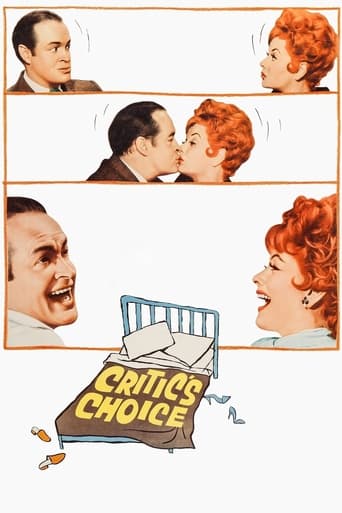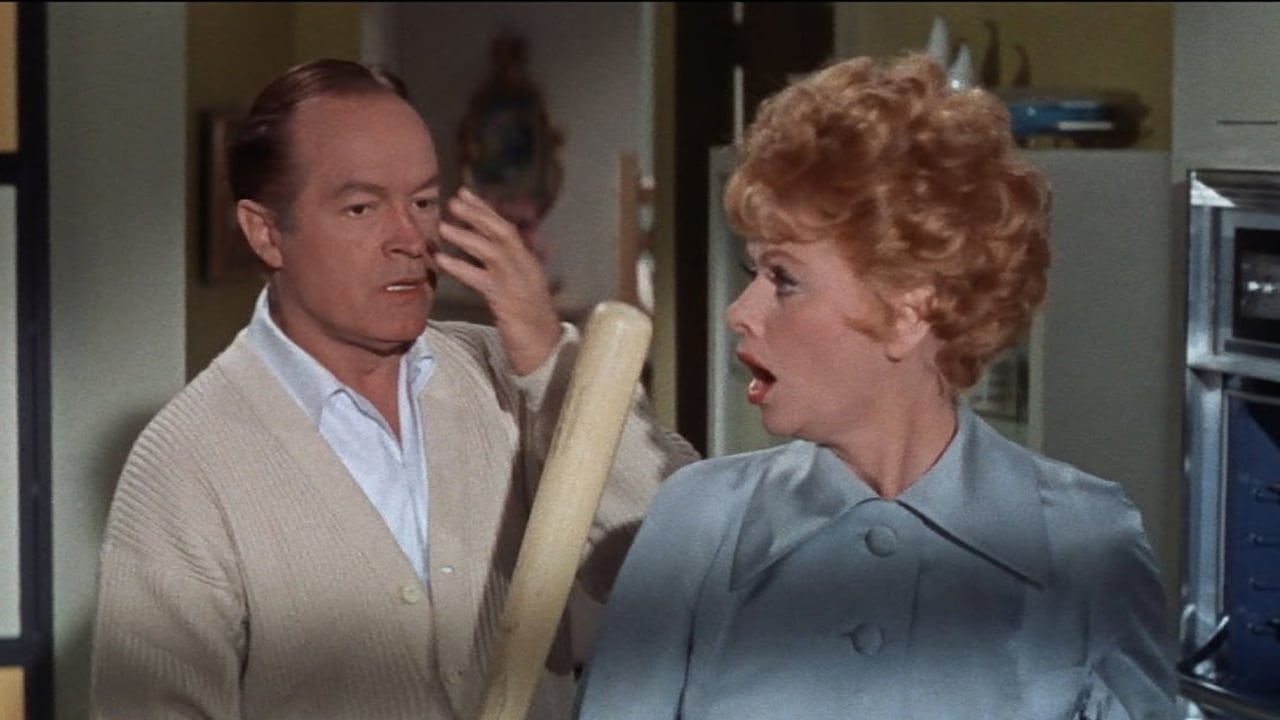a_chinn
Bland comedy/drama about nasty theater critic Bob Hope, who's only happy when he's trashing the latest Broadway sensation, has to contend with his wife, Lucille Ball, deciding she wants to become a playwright. Will Bob write a nasty review of his wife's play? Will Bob write a gushing review? I'm not sure there's any real suspense what actually happens, but the only reason to watch this film is for Hope and Ball, who are good, but the jokes are sadly not all that funny. It also doesn't help that the film lacks the rapid pace of Hope's better comedies. Overall, "Critic's Choice" features two brilliant comedians in a less than brilliant comedy. FUN FACT: This film was based on a play by Ira Levin, who's best known as the author of "Rosemary's Baby" and "The Stepford Wives."
mark.waltz
On I love Lucy, Ricky wouldn't let Lucy be in the show. In this film version of a fairly successful Broadway show, husband Bob Hope doesn't want wife Lucy to write for the stage. You see, he's that villain of the theater called the critic, an umpire with a pen instead of a mask, and equally able to tell the playwright, director and actors that they are out. The film opens with Hope and Ball at a Broadway opening where he gives the play thumbs down and criticizes leading lady Marilyn Maxwell who happens to be his first wife and the mother of their caustic son. When Lucy decides that she's going to become a playwright, hubby Hope offers her no hope by trying to talk her out of it, criticizing her play after its been optioned for Broadway. Hope gets a few good digs in at the profession of theater critic, appropriately obnoxious and seemingly eager to destroy the dreams of everybody who ever picked up a pen and wrote, 'A play by..."This doesn't just spoof the theatre, but takes a look at modern marriages where a woman desired a career and faced objections by her chauvinistic husband. Fine supporting parts played by Jessie Royce Landis as Lucy's mother, Rip Torn as her producer and Ricky Kessum as Hope's son, with smaller roles featuring Jim Backus, Richard Deacon and John Dehner. This is a pretty good adult comedy that doesn't fully reflect how Broadway works, but any film that pays tribute to the footlights of the theater deserves credit for honoring a medium it often betrayed.
JohnHowardReid
This movie seems to have sparked an almost even mixture of highly favorable and downright negative reviews. I'm afraid I agree with the negative brigade. After the box office disaster of "Beau James" (1957) in which Hope invested his own money and literally lost his shirt, he seems to have taken any assignment that came along. (Personally, I thought "Beau James" was an absolutely terrific movie. I loved it, but hardly anyone agrees with me). Anyway, for whatever reason, I think most of us would agree that Bob Hope made some very poor films in the 1960s, starting with the verbose but unfunny "The Facts of Life"; continuing with "Bachelor in Paradise" (which starts amusingly, but the promise of its sprightly opening scenes is unfortunately not realized); recovers a lot of momentum with "Road to Hong Kong" (even though it's one of the least amusing of the "Road" pictures); then really plumbs the depths with "Critic's Choice". For me, it's a movie with no virtues at all. The characters are not just unsympathetic, they're thoroughly unpleasant. As a result, everything they do and say is negative. Maybe it worked well on the stage, where the audience is less involved, less close to the venal, utterly selfish, self-promoting characters. Maybe?
fung0
I find the negative views of this film baffling. I saw it as a kid when it first opened, and have seen it many times since. It's one of my favorite Bob Hope films, and one of my favorite Lucille Ball films - primarily because both of these fine actors are given deeper roles than usual. The quips and comedic shenanigans are there, but rooted in realistic characters and credible motivations. Which only makes them funnier. This is a film that works as drama first, then finds the comedic possibilities.I also appreciate this as one of the very few good films *about* writing. The various phases that Lucy goes through in 'finding her muse' are true to life, and even somewhat inspiring. The reaction of others - especially critic-husband Hope's subtle jealousy - will be familiar to anyone who's ever tried to do creative work.But most of all, I love this film because it is often screamingly funny. Some of the dialog with Hope's ex-wife is very sharp. One of my favorite lines in any movie comes from Hope, after breaking the mainspring of his watch: "Symbolism. I cannot stand symbolism!" Hope spends almost the latter third of the film roaring drunk, delivering some of his best schtick. His scene in the theater balcony almost made me wet myself when I first saw it, and remains a classic slapstick moment. Again, all the funnier because it happens in such a believable context. (As Charlie Chaplin pointed out, when a clown takes a pratfall, it's not nearly as funny as when a pompous stuffed-shirt does it.)If you haven't seen this film, keep an eye out for it; you've got a real treat in store. And if you have seen it but haven't enjoyed it... No, I'm sorry: I have no advice for you. You're too far gone.



 AD
AD



